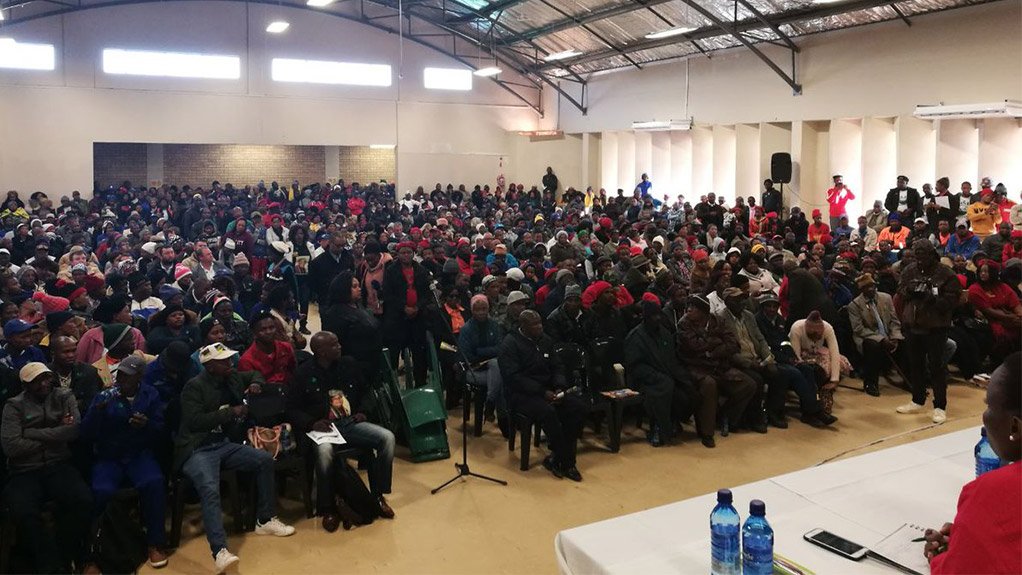"The Ingonyama Trust must not be used to divide the people," a man said at the Constitutional Review Committee's hearing in Vryheid, KwaZulu-Natal on Wednesday, to a loud cheer.
It's no surprise that the matter was raised at the committee's first hearing in KwaZulu-Natal, given recent veiled threats of succession and violence from the Zulu king, who is the sole trustee of the Ingonyama Trust and President Cyril Ramaphosa's assurance to the king that the trust's land is safe. The trust's land constitutes about 30% of the province.
A representative of the African Farmer's Association of South Africa supported an amendment to the Constitution to allow expropriation without compensation, but the Ingonyama Trust must not be touched.
Several other speakers shared this sentiment. There were, however, people who said all land should be expropriated and nationalised.
"All land, belonging to Ingonyama or whoever, must be expropriated and owned by the state," a woman said.
Speaking on the sidelines of the hearing, MPs on the committee also had their say on the trust.
Economic Freedom Fighters (EFF) chief whip and deputy president Floyd Shivambu said Ramaphosa's assurance that Ingonyama Trust land was safe was "way overboard".
"Because we are still busy with a parliamentary process, which is consulting the people now. We're going to process more than 500 000 submissions that were made in Parliament. We're going to sit as a committee to deliberate and process all this information that comes from public hearings, then come with an amicable solution of how [we all] get to benefit from South Africa's land which for the past 300 years has been under the control and ownership of the white minority because of colonial conquest," Shivambu said.
"So, just to make quick assurances and close gaps there and there was reckless by Cyril Ramaphosa."
He stands by the EFF's proposal that all land should be nationalised by the state, but the Ingonyama Trust would play a role in administrating the land, as will all traditional councils.
"It is not a goal of the EFF to abolish traditional leaders' relationship with the land. There will be a defined relationship with the traditional leaders' land."
He said that relationship must not be sexist and discriminate against women, it must not be nepotistic, and it must not allocate large pieces of land to one individual.
United Democratic Movement MP Mncedisi Filtane said the controversy surrounding the trust was much ado about nothing.
He said he had gone through the act which established the trust, and found that the act did not say the land belonged to the Zulu king.
"The issue of the Ingonyama Trust is totally irrelevant to what we are doing here. We are here talking [about] land that is privately owned. That land is not privately owned. That land belongs to the government," he said.
"You can't talk about a government that is going to expropriate its own land."
Democratic Alliance MP Leon Magwebu said his party's view remained clear: people should own title deeds and no government must own land.
"But we respect the kings and the chiefs, and their right to exist and to co-exist with ordinary citizens of the republic," he said.
The hearings followed the pattern established at the committee's earlier hearings in the Northern Cape, Limpopo, the Free State and Mpumalanga, where most black speakers supported an amendment, and white speakers, often representing organised farmers' organisations, opposed it.
The general thrust of the argument in favour of amending the Constitution was the assertion that indigenous people were dispossessed of their land without compensation, impoverishing the people and destroying their culture and pride. Expropriation without compensation was viewed as a remedy to this.
The argument against an amendment has generally been that it will create economic chaos and threaten food security. It has also been suggested that it is not necessary to amend the Constitution to implement effective land reform.
Some farmers in Vryheid said they did not steal any land, but that they bought it.
On Thursday, delegations of the committee are expected to hold hearings in Jozini in KwaZulu-Natal and Rustenburg in the North West.
EMAIL THIS ARTICLE SAVE THIS ARTICLE
To subscribe email subscriptions@creamermedia.co.za or click here
To advertise email advertising@creamermedia.co.za or click here











